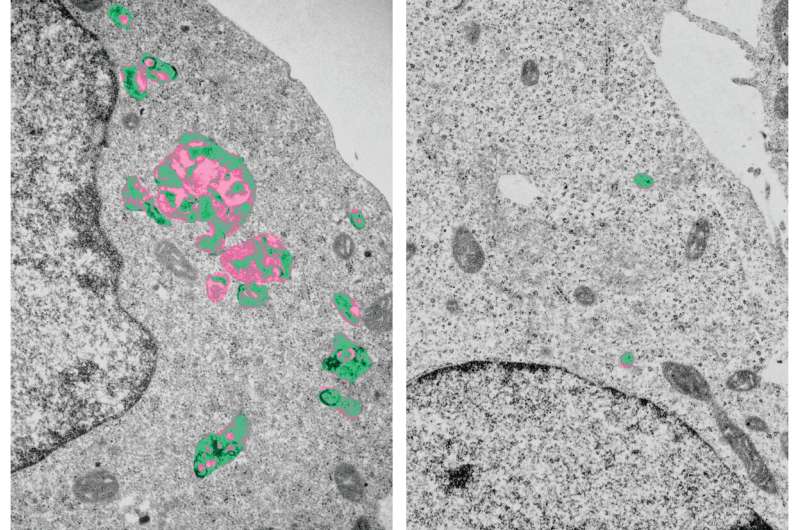Key protein relevant for viral infection and hereditary disease discovered

The starting point of the research was the search for host factors, that are necessary for RNA viruses such as SARS-CoV-2 to replicate. For this purpose, genome-wide CRISPR/Cas knock-out screens in human cell cultures were used to investigate which cells survive after infection with certain viruses.
"In other words, in the cell culture, we switched off virtually every gene in the genome at least once and then analyzed which gene knock-out causes the cells to survive despite viral infection, because the viruses cannot replicate," explains Professor Sabrina Jabs from the Institute of Clinical Molecular Biology (IKMB) at Kiel University (CAU) and the University Medical Center Schleswig-Holstein (UKSH), Campus Kiel.
In this way, Jabs, together with working groups from the Stanford University School of Medicine, U.S., as well as the University Medical Center Hamburg-Eppendorf (UKE), not only found important host factors for viral infections, but also discovered a protein—called LYSET—whose function was previously unknown. It is crucial for the proper functioning of the lysosomes and enables insights into the development of a rare lysosomal storage disorder. The study has now been published in the journal Science, together with another study that has found the same gene on the basis of a different research approach.
"About a year ago, we learned about the other study led by the German Cancer Research Center (DKFZ) in Heidelberg, exchanged data and decided to submit the work to Science together, rather than racing to be the first to publish the discovery in competition with each other. The publications complement each other, so coordinated publication made sense," said Jabs, who is also a co-author of the second publication.
LYSET is essential for transporting soluble enzymes to lysosomes
Lysosomes are important degradation locations within cells. They contain a multitude of enzymes for "digesting" non-cellular as well as own cellular material. A malfunction causes (storage) materials to accumulate within the cell. This is the cause of serious clinical damage in patients with lysosomal storage disorders, a group of hereditary metabolic diseases. "Our work identified LYSET as an essential regulator for a fundamentally important transport mechanism within the cell. Mutations in the LYSET gene are associated with a rare lysosomal storage disorder," said Jabs.
In cells which lack LYSET, the transport of enzymes to the lysosomes is severely disrupted. In addition to the loss of function of the lysosomes, the knock-out of LYSET also prevents certain viruses from causing damage within the cell. The discovery of this new component of a transport mechanism that is important for cell biology provides fundamental insights into cell physiology, which are relevant for human hereditary diseases and at the same time also for viral infections. In the second Science publication by working groups from Heidelberg and Vienna, the significance of LYSET for the growth of tumor cells was also demonstrated.
Starting point for further research
Since the LYSET protein had not been previously characterized, a series of studies will be conducted in the future in order to further investigate its functions. For example, one question is whether a mutation in the LYSET gene is actually the cause of mucolipidosis (ML), a serious hereditary metabolic disease. The disease gene is unknown in around 10 percent of children who are clinically diagnosed with mucolipidosis.
According to Jabs, "We could now analyze biosamples from these patients in order to determine whether there is a mutation in the LYSET gene. We are also interested in the structural characteristics of LYSET which may help us to better understand how it works. The temporary inhibition of LYSET and the lysosomal enzyme transport mechanism could be used as a therapeutic approach to suppress the growth of certain tumors and prevent viral infections."
More information: Christopher M. Richards et al, The human disease gene LYSET is essential for lysosomal enzyme transport and viral infection, Science (2022). DOI: 10.1126/science.abn5648
Catarina Pechincha et al, Lysosomal enzyme trafficking factor LYSET enables nutritional usage of extracellular proteins, Science (2022). DOI: 10.1126/science.abn5637
Journal information: Science
Provided by Kiel University



















